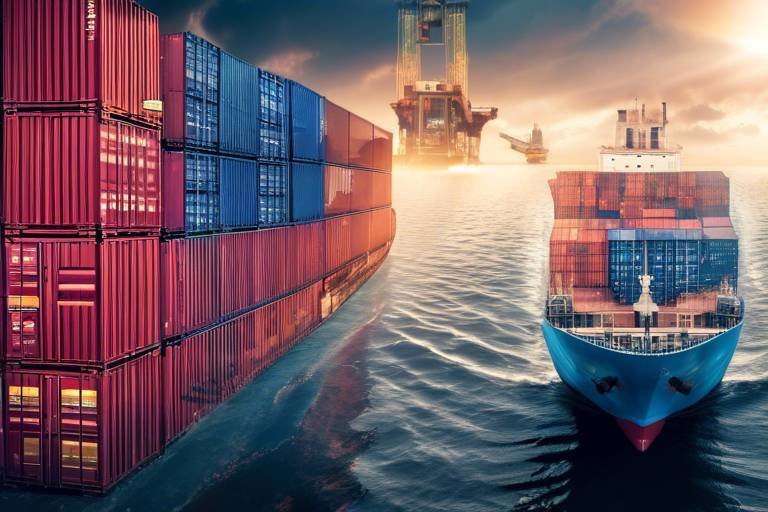Understanding the Impact of Blockchain on Global Trade
In recent years, blockchain technology has emerged as a revolutionary force in the realm of global trade. Imagine a world where every transaction is recorded in a way that is not only secure but also transparent and efficient. That's precisely what blockchain offers! By leveraging this cutting-edge technology, businesses can enhance their operations, reduce costs, and build trust among stakeholders. But what exactly is blockchain, and how is it reshaping the trade landscape? Let's dive in and explore the profound implications of this technology on global commerce.
A foundational understanding of blockchain technology is essential to grasp its impact on global trade. At its core, blockchain is a decentralized ledger that records transactions across multiple computers. This decentralization means that no single entity has control over the entire network, which significantly enhances security and reduces the risk of fraud. Additionally, blockchain is characterized by its immutability, meaning that once a transaction is recorded, it cannot be altered or deleted. This feature is crucial in maintaining the integrity of data. Lastly, the transparency offered by blockchain allows all participants in the supply chain to access the same information, fostering trust and accountability.
One of the standout features of blockchain technology is its ability to provide unprecedented transparency in supply chains. Imagine being able to track a product from its origin to its final destination in real-time. This capability not only allows businesses to monitor their inventory more effectively but also ensures that all stakeholders can verify the authenticity of the products they are dealing with. Such transparency fosters trust among participants and significantly reduces the risk of fraud. For instance, if a consumer knows that their food product has been traced back to a specific farm, they are more likely to trust the brand and make a purchase.
With blockchain, businesses can achieve real-time tracking of goods throughout the supply chain. This means that every movement of a product is recorded and can be accessed instantly by all relevant parties. The benefits of this real-time visibility are immense, particularly for inventory management and logistics. Companies can reduce waste, optimize their supply chains, and respond more swiftly to market demands. For example, if a shipment is delayed, businesses can quickly identify the issue and communicate with their partners, thereby minimizing disruption.
Examining real-world examples of companies that have successfully implemented blockchain for supply chain transparency illustrates its practical benefits and challenges. Companies like Walmart have utilized blockchain to track the journey of food products from farm to store. This initiative has not only improved food safety but has also significantly reduced the time taken to trace the source of contaminated products. Such case studies highlight how blockchain can lead to improved operational efficiencies and better consumer trust.
Despite its advantages, achieving full transparency through blockchain is not without challenges. Issues such as data privacy, the need for standardization, and the integration of existing systems can pose significant barriers. However, solutions are emerging, including the development of industry standards and collaborative platforms that facilitate the sharing of information while respecting privacy concerns. Addressing these challenges is crucial for realizing the full potential of blockchain in enhancing supply chain transparency.
Blockchain also streamlines payment processes in global trade by enabling faster and more secure transactions. Traditional payment methods often involve multiple intermediaries, leading to delays and increased costs. With blockchain, businesses can transact directly with one another, significantly reducing transaction times and fees. The introduction of cryptocurrencies and smart contracts further enhances this process, allowing for automated, secure payments that are executed once predefined conditions are met. This not only speeds up transactions but also minimizes the risk of fraud.
One of the most significant advantages of blockchain technology is its ability to reduce fraud and counterfeiting risks in global trade. By maintaining immutable records and employing verification processes, blockchain ensures that products are authentic and have not been tampered with. This is especially crucial in industries such as pharmaceuticals and luxury goods, where counterfeit products can have dire consequences. The use of blockchain can enhance product authenticity and provide consumers with peace of mind, knowing that what they purchase is genuine.
By ensuring product authenticity, blockchain can bolster consumer trust. When consumers are confident that they are purchasing legitimate products, they are more likely to make repeat purchases and develop brand loyalty. This increased trust can significantly influence purchasing decisions, as consumers are more inclined to support brands that prioritize transparency and authenticity. In a world where misinformation is rampant, being able to verify the source of a product can be a game-changer for businesses.
Different industries are leveraging blockchain technology in unique ways. For example, in the food industry, blockchain can trace the journey of a product from farm to table, ensuring safety and quality. In pharmaceuticals, it can prevent counterfeit drugs from entering the supply chain. Luxury goods brands are also using blockchain to verify the authenticity of their products, ensuring that consumers receive what they pay for. These industry-specific applications highlight the versatility and effectiveness of blockchain technology in enhancing global trade.
Looking ahead, the future developments of blockchain technology hold immense potential to reshape global trade practices and regulations. As more businesses recognize the benefits of blockchain, we can expect to see wider adoption and integration into existing systems. This could lead to a more efficient, transparent, and secure global trade environment. However, it will also require collaboration among stakeholders to address challenges and establish standards that will facilitate the seamless adoption of this technology.
- What is blockchain technology? Blockchain is a decentralized ledger that records transactions across multiple computers, ensuring security and transparency.
- How does blockchain enhance supply chain transparency? It allows stakeholders to track products in real-time, fostering trust and reducing fraud.
- Can blockchain reduce fraud? Yes, blockchain maintains immutable records that enhance product authenticity and reduce counterfeiting risks.
- What are the challenges of implementing blockchain? Challenges include data privacy, the need for standardization, and integrating existing systems.
- What industries benefit from blockchain? Industries such as food, pharmaceuticals, and luxury goods are leveraging blockchain for various applications.

The Basics of Blockchain Technology
To truly understand how blockchain technology is revolutionizing global trade, we need to start with the basics. Blockchain is essentially a decentralized digital ledger that records transactions across many computers in such a way that the registered transactions cannot be altered retroactively. This means that once a transaction is recorded, it becomes a permanent part of the chain, creating a secure and transparent record. The magic of blockchain lies in its three key features: decentralization, immutability, and transparency.
Decentralization eliminates the need for a central authority, allowing participants in the network to maintain control over their own data. This is akin to a group of friends sharing a recipe book; instead of one person holding the book, everyone has a copy, and they can all contribute to it. This collaborative nature not only enhances trust among participants but also reduces the risk of single points of failure.
Next, let’s talk about immutability. Once data is added to the blockchain, it cannot be changed or deleted without the consensus of the network. Imagine writing your favorite quote in stone; it’s there for everyone to see, and no one can erase it. This feature is crucial for maintaining the integrity of transactions, as it ensures that all records are reliable and trustworthy.
Finally, we have transparency. Every participant in the blockchain network has access to the same information, which fosters an environment of accountability. It’s like being in a classroom where every student can see the answers to the test; it encourages honesty and discourages cheating. With blockchain, stakeholders can track products through the supply chain, verifying their origin and ensuring that they meet quality standards.
To illustrate these points, let’s look at a basic comparison of traditional systems versus blockchain systems:
| Feature | Traditional Systems | Blockchain Systems |
|---|---|---|
| Control | Centralized | Decentralized |
| Data Modification | Possible | Immutability |
| Transparency | Limited | High |
In summary, a foundational understanding of blockchain technology is essential to grasp its impact on global trade. By leveraging its decentralized nature, immutable records, and transparent operations, businesses can transform how they interact within the supply chain. The implications are profound, and as we delve deeper into this article, you’ll see how these features enhance not only efficiency but also trust among all stakeholders involved.
- What is blockchain technology? Blockchain is a decentralized digital ledger that records transactions securely and transparently.
- How does blockchain enhance transparency? Blockchain allows all participants to access the same information, fostering accountability and trust.
- What are the key features of blockchain? The key features include decentralization, immutability, and transparency.
- Can data be changed on a blockchain? No, once data is recorded on a blockchain, it cannot be altered without the consensus of the network.

Enhancing Supply Chain Transparency
In today's fast-paced world, where consumers are increasingly aware of the origins of their products, has become a critical necessity. Blockchain technology stands at the forefront of this transformation, offering a robust framework that allows stakeholders to trace products from their inception to their final destination. Imagine knowing exactly where your food comes from or how your favorite luxury item was produced—this level of transparency is now within reach, thanks to blockchain.
One of the standout features of blockchain is its ability to provide a single source of truth. This means that all parties involved in the supply chain—manufacturers, suppliers, distributors, and even consumers—can access the same information in real-time. This shared visibility not only fosters trust among participants but also significantly reduces the risks of fraud and misinformation. For instance, if a food product is recalled due to safety concerns, blockchain allows for immediate identification of the affected batches, streamlining the recall process and ensuring consumer safety.
Moreover, the transparency offered by blockchain can lead to improved relationships among supply chain partners. When everyone can see the same data, it's easier to collaborate and make informed decisions. This collaboration can manifest in various ways, such as optimizing inventory levels, reducing lead times, and enhancing overall efficiency. In fact, a study by Deloitte found that companies implementing blockchain solutions reported an average of 30% improvement in supply chain efficiency.
However, while the benefits are significant, achieving full transparency is not without its challenges. Some companies may be hesitant to share sensitive information, fearing it could give competitors an advantage. Additionally, the initial setup costs and the need for widespread adoption can be daunting. But the long-term benefits often outweigh these challenges. For instance, consider the luxury goods industry, where counterfeit products are a major issue. By using blockchain, brands can provide verifiable proof of authenticity, ensuring that consumers get what they pay for.
Furthermore, the implementation of blockchain technology is not a one-size-fits-all solution. Different industries may require tailored approaches to maximize the benefits of transparency. For example, in the pharmaceutical sector, blockchain can help track the journey of drugs from manufacturers to pharmacies, ensuring that they are not tampered with along the way. Similarly, in the food industry, it can help trace the journey of produce from farm to table, allowing consumers to make informed choices.
In conclusion, enhancing supply chain transparency through blockchain technology is more than just a trend—it's a fundamental shift in how businesses operate. By embracing this technology, companies can not only improve their operational efficiency but also build stronger relationships with their customers and partners. As we move forward, the companies that prioritize transparency will likely stand out in an increasingly competitive marketplace.

Real-Time Tracking of Goods
Imagine a world where you can see exactly where your product is at any given moment, from the moment it leaves the factory until it arrives at your doorstep. This is not a distant dream; it's the reality that blockchain technology brings to global trade through real-time tracking of goods. By utilizing a decentralized ledger, businesses can gain complete visibility into their supply chains, ensuring that every stakeholder—from manufacturers to consumers—can access accurate and timely information.
Real-time tracking is akin to having a GPS for your products. When a package is shipped, its journey is recorded on the blockchain, allowing every participant in the supply chain to see where it is at any time. This level of transparency not only enhances operational efficiency but also significantly improves inventory management. Companies can reduce excess stock and avoid stockouts by understanding the precise location and status of their goods.
Moreover, the benefits extend beyond mere visibility. With real-time tracking, businesses can respond to disruptions more swiftly. For instance, if a shipment is delayed due to unforeseen circumstances, stakeholders can immediately be alerted, allowing them to adjust their plans accordingly. This agility in logistics not only saves time but also reduces costs associated with delays and miscommunication.
To illustrate the effectiveness of real-time tracking, consider the following table that highlights key benefits:
| Benefit | Description |
|---|---|
| Improved Efficiency | Real-time data allows for better decision-making and resource allocation. |
| Reduced Costs | Minimizes losses from delays and mismanagement of inventory. |
| Enhanced Customer Experience | Customers can track their orders, leading to greater satisfaction. |
| Increased Trust | Transparency fosters trust among all parties in the supply chain. |
In addition, the integration of Internet of Things (IoT) devices with blockchain can further enhance tracking capabilities. Sensors can provide real-time updates on temperature, humidity, and other critical factors that affect product quality, especially in industries like food and pharmaceuticals. This synergy between IoT and blockchain creates a robust framework for ensuring that products are not only delivered on time but also in optimal condition.
However, while the advantages of real-time tracking are clear, it’s important to acknowledge the challenges that come with implementing such systems. Companies must invest in the necessary technology and infrastructure to support blockchain solutions, which can be a significant barrier for smaller businesses. Additionally, achieving interoperability between different blockchain systems remains a hurdle that needs to be addressed for widespread adoption.
In conclusion, the ability to track goods in real time through blockchain technology is revolutionizing global trade. It not only enhances operational efficiency and customer satisfaction but also builds a foundation of trust among all stakeholders involved. As businesses continue to embrace this technology, we can expect to see a more transparent and responsive supply chain ecosystem.

Case Studies of Successful Implementations
When it comes to understanding the real-world impact of blockchain on global trade, nothing speaks louder than actual success stories. Companies across various sectors are diving into blockchain technology, and their experiences provide valuable insights into its transformative power. One standout example is Walmart, which has embraced blockchain to enhance food safety. By utilizing IBM's Food Trust blockchain, Walmart can trace the origin of food products in seconds instead of days. This capability not only ensures that customers receive safe food but also helps the company swiftly address any potential contamination issues. Imagine the peace of mind knowing that your lettuce can be traced back to the farm in mere moments!
Another compelling case is that of De Beers, a leader in the diamond industry. They have implemented blockchain to track the provenance of diamonds, ensuring that they are conflict-free. This initiative not only enhances transparency but also strengthens consumer trust. In an industry plagued by ethical concerns, De Beers' use of blockchain serves as a beacon of integrity. Their platform allows buyers to verify the journey of their diamonds from mine to market, a feature that resonates deeply with socially conscious consumers.
In the world of pharmaceuticals, Modum is making waves by combining IoT sensors with blockchain technology. This Swiss company focuses on ensuring the integrity of temperature-sensitive products during shipping. By recording temperature data on the blockchain, Modum provides a verifiable audit trail that guarantees the quality of medications. This is crucial, as even minor temperature fluctuations can render pharmaceutical products ineffective. The ability to prove that a product was stored correctly can save lives and significantly reduce liability for companies.
Moreover, Everledger is revolutionizing the luxury goods market by using blockchain to combat counterfeiting. Their platform allows brands and consumers to verify the authenticity of high-value items like handbags and watches. By creating a digital passport for each product, Everledger ensures that buyers can confidently invest in luxury items without the fear of receiving a counterfeit. This innovative approach not only protects consumers but also preserves the brand's reputation and value.
These case studies illustrate the versatility of blockchain technology across different industries. From food safety to luxury goods, the applications are broad and impactful. However, it is essential to note that while the benefits are significant, the journey to implementation is not without its challenges. Companies must navigate regulatory landscapes, integrate new systems with existing infrastructure, and educate stakeholders about the technology. Yet, as these success stories show, the rewards of embracing blockchain can far outweigh the hurdles, paving the way for a more transparent, efficient, and secure global trade environment.
- What is blockchain technology? Blockchain is a decentralized digital ledger that records transactions across multiple computers, ensuring that the recorded data cannot be altered retroactively.
- How does blockchain enhance supply chain transparency? It allows all participants in the supply chain to access a shared ledger, enabling them to track products from origin to destination in real-time.
- What industries are benefiting from blockchain? Industries such as food, pharmaceuticals, luxury goods, and logistics are leveraging blockchain to improve transparency, reduce fraud, and enhance efficiency.
- Are there any challenges in implementing blockchain? Yes, challenges include regulatory compliance, integration with existing systems, and the need for stakeholder education.
- What is the future of blockchain in global trade? The future looks promising, with potential developments in regulations, technology advancements, and broader adoption across various sectors.

Challenges in Achieving Transparency
While the potential of blockchain technology to enhance transparency in global trade is undeniable, the journey to fully realizing this potential is fraught with challenges. One of the most significant hurdles is the integration of existing systems. Many companies operate on legacy systems that are not designed to interact with blockchain networks. Transitioning from these traditional systems to a decentralized framework can be both costly and time-consuming, often requiring substantial investment in new technology and training for staff.
Another challenge lies in the standardization of data. For blockchain to be effective across different industries and regions, there needs to be a common understanding of what data should be recorded and how it should be formatted. Without universal standards, data silos can emerge, defeating the purpose of transparency that blockchain aims to provide. This can lead to inconsistencies in information, making it difficult for stakeholders to trust the data being shared.
Moreover, the issue of privacy cannot be overlooked. While transparency is crucial, businesses also have to protect sensitive information. Striking a balance between transparency and confidentiality is a tightrope walk. Companies must ensure that while they share data on the blockchain to enhance trust and transparency, they do not expose proprietary information that could benefit competitors or violate privacy regulations.
Additionally, the regulatory landscape presents another layer of complexity. Different countries have varying regulations regarding data sharing and privacy, which can complicate the implementation of blockchain solutions for global trade. Companies must navigate these regulations carefully to avoid legal pitfalls, which can delay or even derail transparency initiatives.
Finally, there is the challenge of stakeholder buy-in. For blockchain to work effectively, all parties in the supply chain must be willing to participate and share information. This requires a cultural shift in how businesses operate, moving from a competitive mindset to one that values collaboration and trust. Achieving this level of cooperation can be one of the most daunting tasks in the journey toward enhanced transparency.
In summary, while blockchain technology offers a promising solution for achieving transparency in global trade, several challenges must be addressed. From integrating existing systems and standardizing data to navigating regulatory landscapes and ensuring stakeholder buy-in, the path forward requires careful planning and collaboration. As the technology continues to evolve, finding innovative solutions to these challenges will be crucial for unlocking the full potential of blockchain in enhancing transparency.
- What is blockchain technology? Blockchain is a decentralized digital ledger that records transactions across many computers in a way that ensures the recorded transactions cannot be altered retroactively.
- How does blockchain enhance transparency? By providing an immutable record of transactions that all parties can access, blockchain increases visibility and accountability throughout the supply chain.
- What are the main challenges of implementing blockchain? Key challenges include integrating with legacy systems, standardizing data, maintaining privacy, navigating regulatory issues, and achieving stakeholder buy-in.
- What industries can benefit from blockchain? Industries such as food, pharmaceuticals, luxury goods, and logistics can significantly benefit from blockchain technology in terms of transparency and efficiency.

Improving Payment Processes
When we think about global trade, one of the biggest hurdles that businesses face is the complexity of payment processes. Traditional methods can be slow, cumbersome, and laden with fees. Enter blockchain technology, a game changer that is revolutionizing how payments are made across borders. With its decentralized nature, blockchain allows for transactions to occur directly between parties without the need for intermediaries like banks. This not only speeds up the process but also significantly reduces costs. Imagine being able to send money across the globe in a matter of minutes rather than days—sounds like a dream, right? Well, that dream is becoming a reality thanks to blockchain.
One of the most exciting aspects of blockchain in payment processes is the use of cryptocurrencies. These digital currencies operate on blockchain networks and can be used for international transactions. They provide a level of security and anonymity that traditional currencies simply can't match. For instance, when you send Bitcoin or Ethereum, the transaction is recorded on the blockchain, creating an immutable ledger that both parties can trust. This means that once a transaction is confirmed, it cannot be altered or reversed, which drastically reduces the chances of fraud.
But that's not all. Smart contracts, another innovative feature of blockchain, are also transforming payment processes. These self-executing contracts with the terms of the agreement directly written into code can automate transactions and ensure that payments are only released when certain conditions are met. For example, in a supply chain scenario, a smart contract could stipulate that payment is made only when goods are delivered and verified by both parties. This level of automation not only speeds up transactions but also minimizes disputes and enhances trust among stakeholders.
To illustrate the impact of blockchain on payment processes, consider the following table that compares traditional payment methods with blockchain-enabled payments:
| Aspect | Traditional Payment Methods | Blockchain Payments |
|---|---|---|
| Speed | Days to weeks | Minutes |
| Fees | High transaction fees | Lower fees |
| Security | Vulnerable to fraud | Immutable and secure |
| Transparency | Limited visibility | Full transparency |
As we delve deeper into the world of blockchain, it becomes clear that improving payment processes is just the tip of the iceberg. The technology holds the potential to reshape not only how we conduct transactions but also how we perceive trust in the digital age. With faster, cheaper, and more secure payments, businesses can focus on what truly matters—growing their operations and serving their customers. So, the next time you make a cross-border payment, remember that blockchain is quietly working behind the scenes, making the process smoother and more efficient than ever before.
- What is blockchain technology? Blockchain is a decentralized digital ledger that records transactions across many computers securely and transparently.
- How does blockchain improve payment processes? It enables faster, cheaper, and more secure transactions by eliminating intermediaries and automating processes with smart contracts.
- What are cryptocurrencies? Cryptocurrencies are digital currencies that use cryptography for security and operate on blockchain technology.
- What are smart contracts? Smart contracts are self-executing contracts with the terms of the agreement directly written into code, allowing for automated and trustworthy transactions.

Reducing Fraud and Counterfeiting
In the fast-paced world of global trade, fraud and counterfeiting have become pervasive issues that threaten the integrity of supply chains and the trust of consumers. Blockchain technology emerges as a powerful ally in combating these challenges. By leveraging its core features, such as immutability and transparency, businesses can create a more secure trading environment. Imagine a world where every product's journey is recorded on a digital ledger that cannot be altered; this is the promise of blockchain.
One of the most significant advantages of blockchain is its ability to maintain an unchangeable record of transactions. Each time a product changes hands, the transaction is logged in a way that is accessible to all parties involved. This means that if a counterfeit product enters the supply chain, it can be traced back to its origin, thereby holding parties accountable. For instance, a luxury brand can verify the authenticity of its products by examining the blockchain record, ensuring that only genuine items reach consumers. This level of scrutiny not only protects brands but also empowers consumers to make informed purchasing decisions.
Moreover, blockchain's decentralized nature eliminates the need for intermediaries, which often complicate verification processes. Traditional supply chains rely on multiple parties to validate transactions, creating opportunities for fraud. With blockchain, the need for these intermediaries is significantly reduced, resulting in a streamlined process that is less susceptible to manipulation. This shift can lead to a reduction in costs and an increase in efficiency, allowing businesses to focus on what truly matters—delivering quality products to their customers.
To illustrate the impact of blockchain on reducing fraud and counterfeiting, consider the following table highlighting some key statistics:
| Statistic | Impact |
|---|---|
| Over $1 trillion | Estimated global cost of counterfeit goods annually |
| 30% | Reduction in counterfeit products reported by companies using blockchain |
| 70% | Increase in consumer trust in brands utilizing blockchain for product verification |
Furthermore, blockchain technology enhances the verification processes that are crucial for maintaining product authenticity. For example, in the food industry, blockchain can track the journey of a product from farm to table. If a food item is found to be contaminated, it can be traced back through the supply chain, allowing for quick action to be taken. This not only protects consumers but also safeguards the reputation of the brands involved.
However, while blockchain presents a robust solution to fraud and counterfeiting, it is not a magic bullet. Companies must also invest in education and training to ensure that all stakeholders understand how to utilize this technology effectively. Additionally, as with any technology, there are challenges to overcome, such as the initial costs of implementation and the need for widespread adoption across industries.
In conclusion, blockchain technology is paving the way for a more secure and transparent global trade environment. By significantly reducing the risks associated with fraud and counterfeiting, it fosters trust among consumers and businesses alike. As companies increasingly recognize the value of blockchain, we can expect to see a transformation in how products are verified and authenticated, ultimately leading to a safer marketplace for everyone.
- How does blockchain prevent counterfeiting? Blockchain creates an immutable record of transactions, allowing for the tracking of products throughout the supply chain, making it difficult for counterfeit items to go unnoticed.
- Can blockchain be used in all industries? Yes, while the applications may vary, blockchain can be adapted to various sectors, including food, pharmaceuticals, and luxury goods, enhancing transparency and security.
- What are the challenges of implementing blockchain? Initial costs, the need for industry-wide adoption, and the requirement for education on how to use the technology effectively are some of the challenges businesses may face.

Impact on Consumer Trust
In today's fast-paced market, consumer trust is everything. Imagine walking into a store and feeling completely confident that the product you’re buying is authentic. This is where blockchain technology steps in to create a new foundation for trust. By providing a transparent and immutable record of every transaction, blockchain allows consumers to verify the authenticity of products like never before. Gone are the days of relying solely on brands' promises; now, consumers can access detailed information about a product's journey right from the source to the shelf.
Consider a scenario where a consumer buys a luxury handbag. With blockchain, they can trace the bag’s history, confirming it was made from genuine materials and produced in ethical conditions. This level of transparency not only enhances trust but also empowers consumers to make informed purchasing decisions. The ability to verify authenticity directly influences their choices, often leading to increased brand loyalty. The connection between trust and purchasing behavior is profound; when consumers feel secure in their purchases, they are more likely to return to that brand.
Moreover, the implications of heightened consumer trust extend beyond individual transactions. Brands that leverage blockchain technology can differentiate themselves in a crowded market. They can communicate their commitment to quality and authenticity, fostering a deeper relationship with their customers. This is especially crucial in industries plagued by counterfeiting, such as pharmaceuticals and luxury goods. By embracing blockchain, companies can not only protect their reputation but also enhance their overall brand value.
However, it's essential to recognize that the impact of blockchain on consumer trust is not just about technology; it’s about the human element. Trust is built on relationships, and while blockchain can provide the data, brands must also engage with their customers. Transparency should be accompanied by clear communication and education about how blockchain works and the benefits it offers. This combination of technology and human interaction can create a robust framework for trust that benefits everyone involved.
As we look to the future, the role of blockchain in enhancing consumer trust is likely to grow. More companies are expected to adopt this technology, leading to a ripple effect across industries. Consumers will become increasingly aware of the benefits of blockchain, and those brands that fail to adapt may find themselves left behind. In this evolving landscape, trust will not just be an advantage; it will be a necessity.
- How does blockchain enhance consumer trust?
Blockchain provides a transparent and immutable record of transactions, allowing consumers to verify the authenticity of products. - What industries benefit most from blockchain technology?
Industries such as luxury goods, pharmaceuticals, and food supply chains see significant benefits from improved transparency and trust. - Can blockchain eliminate all fraud?
While blockchain greatly reduces the risk of fraud, no system is entirely foolproof. Continuous vigilance and adaptation are necessary. - How can brands communicate their use of blockchain to consumers?
Brands can educate consumers through marketing campaigns, product labeling, and online resources that explain the technology and its benefits.

Industry-Specific Applications
When we think about blockchain technology, it’s easy to get lost in the technical jargon and abstract concepts. But let’s break it down and explore how different industries are harnessing this revolutionary technology to solve real-world problems. Blockchain is not a one-size-fits-all solution; its applications vary widely across sectors, each reaping unique benefits that cater to their specific needs.
In the food industry, for instance, blockchain is making waves in ensuring food safety and traceability. Imagine being able to track a mango from the farm in Mexico to your grocery store in New York with just a scan of your phone. Companies like Walmart and IBM have partnered to create blockchain solutions that allow for complete visibility in the supply chain. This not only helps in recalling contaminated products quickly but also builds consumer trust by providing them with information about the origin and handling of their food.
Moving over to the pharmaceutical sector, blockchain is a game-changer in combating counterfeit drugs. The World Health Organization estimates that up to 10% of medicines in low- and middle-income countries are substandard or falsified. By implementing blockchain, companies can create an immutable record of each transaction, ensuring that every pill can be traced back to its source. This not only protects consumers but also strengthens the integrity of the healthcare system.
The luxury goods market is also tapping into blockchain to fight counterfeiting. Brands like LVMH are using this technology to verify the authenticity of their products. By providing digital certificates of authenticity stored on a blockchain, consumers can rest assured that the handbag they just purchased is the real deal and not a knockoff. This kind of verification can significantly enhance brand loyalty and consumer confidence.
Furthermore, the automotive industry is exploring blockchain for various applications, such as tracking the provenance of parts and ensuring compliance with environmental regulations. For example, manufacturers can use blockchain to record the lifecycle of a vehicle's components, from production to recycling, ensuring that they meet sustainability standards. This not only helps in regulatory compliance but also appeals to the growing consumer base that values eco-friendly practices.
In the realm of financial services, blockchain is revolutionizing how transactions are conducted. Banks and financial institutions are leveraging blockchain to streamline processes, reduce transaction times, and enhance security. Smart contracts, which automatically execute agreements when certain conditions are met, are gaining traction, making processes like loan approvals and insurance claims faster and more efficient.
As we can see, the applications of blockchain technology are as diverse as the industries themselves. Each sector is finding innovative ways to integrate this technology, ultimately leading to enhanced efficiency, security, and trust. The future looks bright for blockchain as it continues to evolve and adapt, promising to reshape how we do business across the globe.
- What is blockchain technology? Blockchain is a decentralized digital ledger that records transactions across many computers securely and immutably.
- How does blockchain enhance supply chain transparency? It allows all stakeholders to track products in real-time, fostering trust and reducing fraud.
- Can blockchain prevent counterfeiting? Yes, by providing an immutable record of transactions, blockchain can verify the authenticity of products.
- What industries are using blockchain? Industries such as food, pharmaceuticals, luxury goods, automotive, and financial services are actively implementing blockchain solutions.

The Future of Blockchain in Global Trade
As we look to the horizon, the future of blockchain technology in global trade is not just promising; it's downright exhilarating. Imagine a world where every transaction is recorded in a secure, transparent manner, reducing the risk of fraud and increasing trust among stakeholders. This isn't just a far-off dream; it's the trajectory we're on. The potential for blockchain to revolutionize global trade is immense, and several key trends are emerging that could shape its evolution.
First and foremost, we can expect to see an increase in the adoption of smart contracts. These self-executing contracts with the terms of the agreement directly written into code will streamline processes and eliminate the need for intermediaries. Businesses will be able to execute transactions automatically when conditions are met, enhancing efficiency and reducing costs. For example, a shipment could be automatically paid for once it reaches its destination, reducing delays and ensuring that all parties are satisfied.
Moreover, the integration of Internet of Things (IoT) devices with blockchain is set to create a new level of operational efficiency. Imagine sensors embedded in products that can provide real-time data on their location and condition. This data can be recorded on a blockchain, allowing for unparalleled visibility and accountability in the supply chain. Companies will not only know where their products are at all times, but they will also be able to verify their integrity, thus minimizing the risk of spoilage or damage.
However, as with any technological advancement, challenges remain. Regulatory frameworks are still catching up to the rapid development of blockchain technology. Governments and international bodies will need to establish clear guidelines to facilitate its widespread adoption while ensuring compliance with existing laws. This could lead to a more standardized approach to international trade, making it easier for businesses to navigate the complexities of cross-border transactions.
Furthermore, the need for education and awareness around blockchain technology cannot be overstated. Many businesses, especially small to medium-sized enterprises, may feel overwhelmed by the technical complexities or unsure about how to implement blockchain solutions effectively. This presents an opportunity for industry leaders to step in and provide guidance, sharing best practices and success stories to inspire confidence and encourage adoption.
In conclusion, the future of blockchain in global trade is bright, filled with opportunities for innovation and growth. As businesses embrace this transformative technology, we can expect to see enhanced transparency, efficiency, and security in transactions. The journey may have its bumps, but the destination promises a more interconnected and trustworthy global trade environment.
- What is blockchain technology? - Blockchain is a decentralized digital ledger that records transactions across many computers securely and transparently.
- How does blockchain improve global trade? - By enhancing transparency, reducing fraud, and streamlining payment processes, blockchain significantly improves the efficiency of global trade.
- What are smart contracts? - Smart contracts are self-executing contracts with the terms of the agreement directly written into code, which automatically enforce and execute the contract when conditions are met.
- What challenges does blockchain face in global trade? - Regulatory uncertainties, the need for education, and integration with existing systems are significant challenges that blockchain must overcome.
Frequently Asked Questions
- What is blockchain technology?
Blockchain technology is a decentralized digital ledger that records transactions across multiple computers. This ensures that the recorded transactions cannot be altered retroactively, providing a high level of security and transparency.
- How does blockchain enhance supply chain transparency?
Blockchain enhances supply chain transparency by allowing all stakeholders to access a shared, immutable record of transactions. This means that every product can be tracked from its origin to its final destination, fostering trust and reducing the chances of fraud.
- Can blockchain help reduce fraud in global trade?
Absolutely! By maintaining immutable records and allowing easy verification processes, blockchain significantly reduces the risks of fraud and counterfeiting. This ensures that consumers receive genuine products, which boosts overall trust in the market.
- What are smart contracts and how do they work?
Smart contracts are self-executing contracts with the terms of the agreement directly written into code. They automatically enforce and execute the terms when predefined conditions are met, streamlining payment processes and reducing the need for intermediaries.
- What industries are benefiting from blockchain technology?
Various industries, including food, pharmaceuticals, and luxury goods, are leveraging blockchain technology. For instance, in the food industry, blockchain helps track the journey of products from farm to table, ensuring safety and authenticity.
- What challenges does blockchain face in achieving transparency?
Despite its advantages, blockchain faces challenges such as scalability issues, integration with existing systems, and regulatory uncertainties. Addressing these challenges is crucial for maximizing its potential in global trade.
- How does blockchain affect consumer trust?
By providing a reliable means to verify product authenticity, blockchain can significantly enhance consumer trust. When customers know they are purchasing genuine products, they are more likely to remain loyal to brands.
- What is the future of blockchain in global trade?
The future of blockchain in global trade appears promising, with potential developments that could reshape practices and regulations. As more businesses adopt this technology, we can expect increased efficiency, security, and transparency across the supply chain.



















